<![CDATA[The 13th June marks the anniversary of the day Wat Tyler led the Peasant's Revolt of 1381 into London. The English capital descended into chaos as the peasants burnt and looted the city, cementing the revolt as the most significant peasant uprising in the feudal period of English history. Originating in the South-East of England, it was when the revolt reached London that its significance became apparent. The peasants went on to capture the Tower of London, a feat which had never been done before. Two powerful figures, the Archbishop of Canterbury, and the King's Treasurer, were killed by the rebels. The King was forced to meet the peasants and discuss their demands, again, something without precedent. In feudal England, the peasantry was kept in line through the threat of harsh punishment, and restrictions on property and movement which were a consequence of their position in society. The idea of peasants not only mobilising, but reaching the capital and intimidating the country's rulers, was unthinkable. In a broader context the event is a remarkable moment in feudal history and the development of protest. A variety of long term factors contributed to the resentment which ultimately exploded into the Peasant's Revolt. Thirty five years before the revolt the Black Death had struck England, the catastrophic pandemic decimating huge swathes of the peasant population and dramatically altering the balance of society. A sudden scarcity of labour gave workers greater bargaining power. Landlords had to encourage workers to stay on their estates, and therefore offered them freedom and wages to continue working. In 1380, Parliament started working to lower the wages of labourers and reinforce their subordinate position in society, a reactionary move which led to the peasantry fearing a return to the situation before the Black Death. Another underlying cause was the state of almost perpetual war with France. The wars were largely paid for by taxation of peasants. In 1380, King Richard announced a new Poll-Tax which meant everyone over the ago of 15 had to pay a shilling, a significant amount to the poorest in society. This was the third such tax that had been raised in four years, and added to the resentment already felt by the peasantry. The trigger for the revolt came in May 1381, when peasants in Brentwood, Esssex, resisted a poll-tax collector. From Brentwood, defiance spread to neighbouring villages and then the surrounding counties of Hertordshire, Kent and Norfolk. Soldiers were sent to the rebelling villages to restore order but the resistors had become armed and organised, and turned the military away. Wat Tyler, from Kent, had emerged as the leader of the peasants and following the attempt by the army to extinguish the revolt, led the rebels to London. Along the way they burned down government buildings and destroyed tax records. Once at the outskirts of the city, London's urban poor opened the gates and joined in the revolt themselves. On 14th June, two days after the peasant's arrival in London, the king agreed to meet them at Mile End in East London. Richard agreed to the peasant's demands of abolishing serfdom and the restrictions on wages, but the chaos in London continued, with Tyler leading the force that seized the Tower of London and executed the Archbishop of Canterbury. The following day, having spent the night in fear of his life as violence reigned over the city, the king again met Tyler at Smithfields. In a scuffle, the mayor of London fatally wounded Tyler with a sword. Hundreds of troops arrived at the scene, and executed the rebel leaders, while the rest of the mob quickly dispersed. Over the next few days troops brutally restored order across the south-east of England. Richard revoked the concessions he had made at Mile End, and the Peasant's Revolt came to an end. ]]>
Peasant Revolt Hits London
